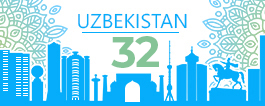
The Government portal of the
Republic of Uzbekistan
History
The Uzbek people is one of the oldest nations in the world and has almost 3000 year old history of statehood. Archaeological finds in the territories monuments Selengur, Kulbulak Teshiktash and prove that the first human settlement on the territory of Uzbekistan were more 1-1.2 million years ago.
Ancient Khorezm and Bactria are early states on the territory of Uzbekistan, during the formation of which is accounted for VIII-VII centuries B.C. Monuments Afrasiyab, Kuzalikir, Uzunkir, Yerkurgan can serve as an example of urban culture. One of the monotheistic religions - Zoroastrianism originated in the territory of Uzbekistan. Avesta - the holy book of Zoroastrianism is the spiritual heritage of the Uzbek people.
In VI-IV centuries. BC on the territory of Central Asia invaded Aheminidy, then the Greco-Macedonians. Against foreign invaders fought such patriots as Tumaris, Chirac and Spitamen.
History of Uzbek statehood during its continuous development was the period of greatest prosperity and greatness. In the III. BC - III in. AD on the territory of Uzbekistan prospered states like Davan, Kang, Kushan and Khorezm. The most prominent is the development of culture and art in the period of the Kushan state.

In the early Middle Ages on the territory of Uzbekistan was ruled state Hionidov, Kidaritov, Eftalits and Turk Empire. During this period, the data of the state includes a huge territory, conducted a large-scale economic and trade policies with neighbouring states.
In VIII-IX centuries. To the territory of Uzbekistan with the Arab conquest and penetrate new cultural branch. Along with the struggle against the invaders, material and spiritual losses to the IX-XII centuries. is the formation of the Uzbek people. During this period, the Turkish language has taken a dominant position and began the formation of the literary language.
In the IX-XII centuries. During the reign of Samanids Karakhanids Khorezm and there have been some positive changes in particular art and cultural life. In the good of the country and the people worked such great scientists as Al-Khwarizmi, Ahmad al-Fargani, Farabi, Abu Rayhan Biruni, Abu Ali ibn Sina, al-Zamakhshari and others. Also in the development of religious sciences have made a valuable contribution to the Imam al-Bukhari, al-Tirmidhi, Nazhmuddinov Kubra Bahavuddin Naqshband and others.
The beginning of the XIII century. Mongols, led by Genghis Khan, defeating the state of Khorezm, conquered all the territory of Central Asia. The brave sons of our motherland - Jaloliddin Manguberdi, Temur Malik and others were incessant war, defending his people from foreign invaders.

The second half of the XIV century. In the political arena appears Amir Temur, who spoke against the Mongols and eventually drove them out of the territory of our country. Centralized state during the period of Amir Temur enabled comprehensive prosperity, especially in the economic, social and cultural life of the country. Amir Temur creating a centralized state, the state apparatus has streamlined management, strengthened the borders of the state, the army strengthened, improved socio-economic life of the population, created the conditions for the flourishing of crafts and trade, reform the tax system, success in international diplomacy. During the reign of Ulugbek, Husain Baykara and Zakhiriddin Babur flourished science, literature and the Arts. It was during this period of Alisher Navoi created their works in the Turkic language and made its contribution to the development indisputable spiritual heritage of the Uzbek people.
With the policy of Amir Temur put an end to the Mongol conquest campaigns, and many people have been released from the Mongol yoke. Its policy prevented Ottoman conquest of Europe. During the period of Amir Temur intensified trade and diplomatic relations with the European states.
In XVI-XVII century. On the territory of Uzbekistan and the right of states Sheibanids Ashtarkhanids. During the period of decline occurs Ashtarkhanids centralized state, which leads to fragmentation. As a result, in a XVIII. formed Emirate of Bukhara, Khiva and Kokand khanates.
As a result of conquest campaigns of the Russian Empire in Central Asia, our country in the second half of the XIX century. until 1991 was part of the Russian Empire and the Soviet Union.
At the beginning, the 80s of the twentieth century political and economic crisis made it possible to accelerate the movement for independence in Uzbekistan. As a result of a long historical August 31, 1991, under the leadership of Islam Karimov has achieved national independence.
Gaining independence Uzbekistan took place in a difficult political and socio-economic conditions. Since over 130 years, dominated the colonial regime made it impossible for the independent development of the Republic.
Declaration of independence has put before the people and the country's leadership task of fundamental reforms. As a result of internal and external conducted by the government led by Islam Karimov of Uzbekistan has been recognized by the international community as an independent state. Within a short time determined Uzbekistan's own model of development.
Developed and implemented by the First President Islam Karimov "The Uzbek model" of development paves the way for the socio-economic development of the country. In a short time was provided grain and oil independence. Uzbekistan from the agrarian and raw material country has become a rapidly growing, exporting modern technology country. The correctness of the chosen path of development of Uzbekistan confirmed and began in 2008 the global financial and economic crisis. "Uzbek model" has successfully weathered the crisis, deservedly received high positive ratings from international financial organizations and experts.
Historical experience shows that no country can develop in isolation from the world community. As a result of a balanced foreign policy, Uzbekistan has been recognized by more than 180 countries and with more than 130 countries established diplomatic relations. The Republic of Uzbekistan is a member of such authoritative international organizations as the UN, CIS, SCO and others.
To date, Uzbekistan has bilateral and mutually beneficial cooperation in the economic, political and cultural spheres with countries such as Austria, Great Britain, Germany, Greece, Indonesia, Iran, Spain, Italy, Canada, China, Malaysia, South Korea, Russia, the USA, Thailand Turkey, France, Czech Republic, Switzerland, Sweden.
In accordance with the Constitution of Uzbekistan ensured equality of citizens regardless of their ethnic, linguistic and religious identity. Currently in the country in accordance inhabited by more than one hundred nations and nationalities, for which all the necessary conditions. Operate in Uzbekistan Committee on interethnic relations and friendly ties with foreign countries under the Cabinet of Ministers of the Republic of Uzbekistan, as well as more than a hundred national cultural centers.










